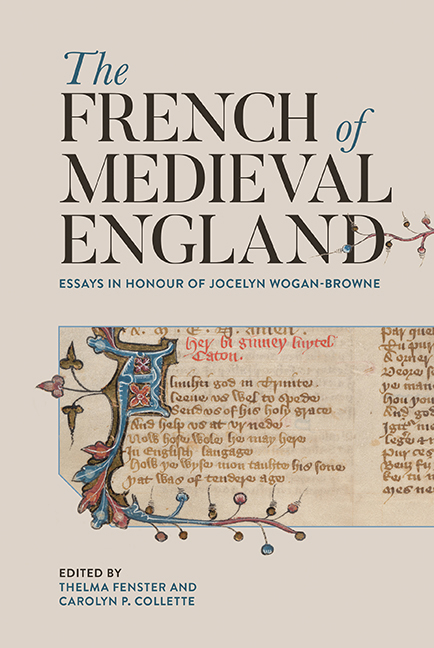Book contents
- Frontmatter
- Contents
- List of Illustrations
- List of Contributors
- List of Abbreviations
- Foreword: ‘The Light I Never Left Behind’: Jocelyn Wogan-Browne
- Introduction: Recognizing the French of Medieval England
- 1 The Gloss to Philippe de Thaon's Comput and the French of England's Beginnings
- 2 The Scandals of Medieval Translation: Thinking Difference in Francophone Texts and Manuscripts
- 3 Contrafacture and Translation: The Prisoner's Lament
- 4 Complaining about the King in French in Thomas Wright's Political Songs of England
- 5 The Chanson d’Aspremont in Bodmer 11 and Plantagenet Propaganda
- 6 The Use of Anglo-Norman in Day-to-Day Communication during the Anglo-Scottish Wars (1295–1314)
- 7 Middle English Borrowing from French: Nouns and Verbs of Interpersonal Cognition in the Early South English Legendary
- 8 William Langland Reads Robert Grosseteste
- 9 Disability Networks in the Campsey Manuscript
- 10 English Women and Their French Books: Teaching about the Jews in Medieval England
- 11 French Residents in England at the Start of the Hundred Years War: Learning English, Speaking English and Becoming English in 1346
- 12 French Immigrants and the French Language in Late-Medieval England
- 13 Fashioning a Useable Linguistic Past: The French of Medieval England and the Invention of a National Vernacular in Early Modern France
- 14 Admiring Ambivalence: on Paul Meyer's Anglo-Norman Scholarship
- 15 Twenty-First Century Gower: The Theology of Marriage in John Gower's Traitié and the Turn toward French
- 16 Royaumes sans frontières: The Place of England in the Long Twelfth Century
- Afterword
- Bibliography
- Index
- Publications of Jocelyn Wogan-Browne
- Tabula Gratulatoria
10 - English Women and Their French Books: Teaching about the Jews in Medieval England
Published online by Cambridge University Press: 12 August 2020
- Frontmatter
- Contents
- List of Illustrations
- List of Contributors
- List of Abbreviations
- Foreword: ‘The Light I Never Left Behind’: Jocelyn Wogan-Browne
- Introduction: Recognizing the French of Medieval England
- 1 The Gloss to Philippe de Thaon's Comput and the French of England's Beginnings
- 2 The Scandals of Medieval Translation: Thinking Difference in Francophone Texts and Manuscripts
- 3 Contrafacture and Translation: The Prisoner's Lament
- 4 Complaining about the King in French in Thomas Wright's Political Songs of England
- 5 The Chanson d’Aspremont in Bodmer 11 and Plantagenet Propaganda
- 6 The Use of Anglo-Norman in Day-to-Day Communication during the Anglo-Scottish Wars (1295–1314)
- 7 Middle English Borrowing from French: Nouns and Verbs of Interpersonal Cognition in the Early South English Legendary
- 8 William Langland Reads Robert Grosseteste
- 9 Disability Networks in the Campsey Manuscript
- 10 English Women and Their French Books: Teaching about the Jews in Medieval England
- 11 French Residents in England at the Start of the Hundred Years War: Learning English, Speaking English and Becoming English in 1346
- 12 French Immigrants and the French Language in Late-Medieval England
- 13 Fashioning a Useable Linguistic Past: The French of Medieval England and the Invention of a National Vernacular in Early Modern France
- 14 Admiring Ambivalence: on Paul Meyer's Anglo-Norman Scholarship
- 15 Twenty-First Century Gower: The Theology of Marriage in John Gower's Traitié and the Turn toward French
- 16 Royaumes sans frontières: The Place of England in the Long Twelfth Century
- Afterword
- Bibliography
- Index
- Publications of Jocelyn Wogan-Browne
- Tabula Gratulatoria
Summary
Among the nearly 1,000 items in French that survive from medieval England's four hundred years of francophone culture, as listed in Dean and Boulton's indispensable Anglo-Norman Literature, are numerous manuscripts commissioned by aristocratic English women for whom French had become a language of culture and learning. Such women, some of whom may well have controlled budgets of their own, benefitted from the increasing wealth of the English aristocracy and the availability of a shared, privileged vernacular language. They bore responsibility for the moral and religious education of their children and of other family and household members, and they had the means to commission devotional and biblical material. Often, such women could personalize their religious reading by participating in the decision process, consulting with their clerics, scribes and illustrators about a book's contents, order of selections and the kinds and numbers of illustrations, perhaps with the intention of making them suitable for the instruction of a range of adults and children. As the patrons of frequently luxurious and expensively produced books, women helped to advance the well-documented ‘laicization’ of religious literature in medieval England, in large part the result of an environment notable for the very close and porous links between the high-ranking laity and the clergy (so much so that, as Sara Lipton observes studying the Bible moralisee, divisions between lay and clerical become ‘inadequate categories of investigation’). Modern scholars, prominent among them Jocelyn Wogan-Browne, have done a great deal to locate, describe and interpret English women's intellectual contributions, especially to manuscript culture. That work, along with Wogan-Browne's extensive investigations into England's long French-language moment, have altered our conceptual map of medieval England's literary practices.
In the twelfth and thirteenth centuries especially, the Church wished to strengthen and define itself anew and to reach out more broadly to laypeople (as codified, for example, in various canons of the Fourth Lateran Council, 1215). In the same period, enmity toward the Jews also increased, reaching a zenith (but not an end) in the 1290 Expulsion. Why this was so, and why the period beginning in the twelfth century in particular provided the soil upon which anti-Jewish feeling grew, has been the subject of numerous studies.
- Type
- Chapter
- Information
- The French of Medieval EnglandEssays in Honour of Jocelyn Wogan-Browne, pp. 175 - 189Publisher: Boydell & BrewerPrint publication year: 2017

